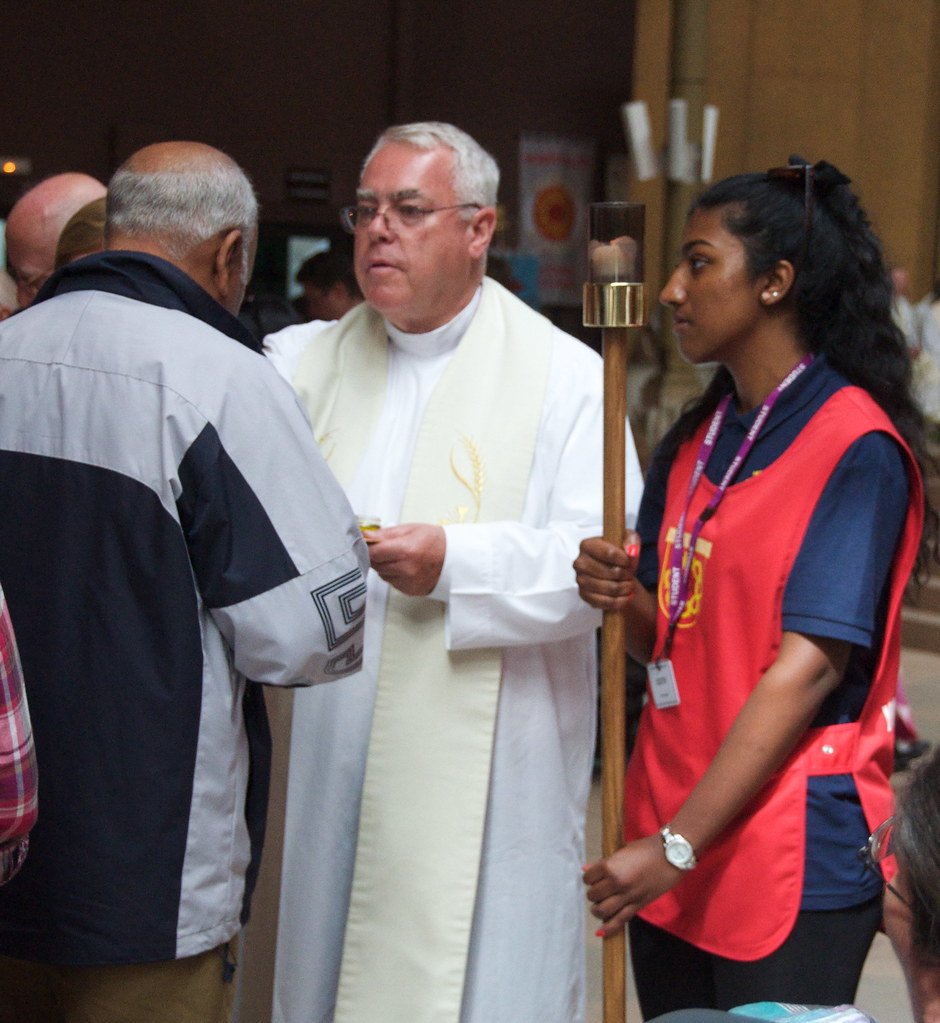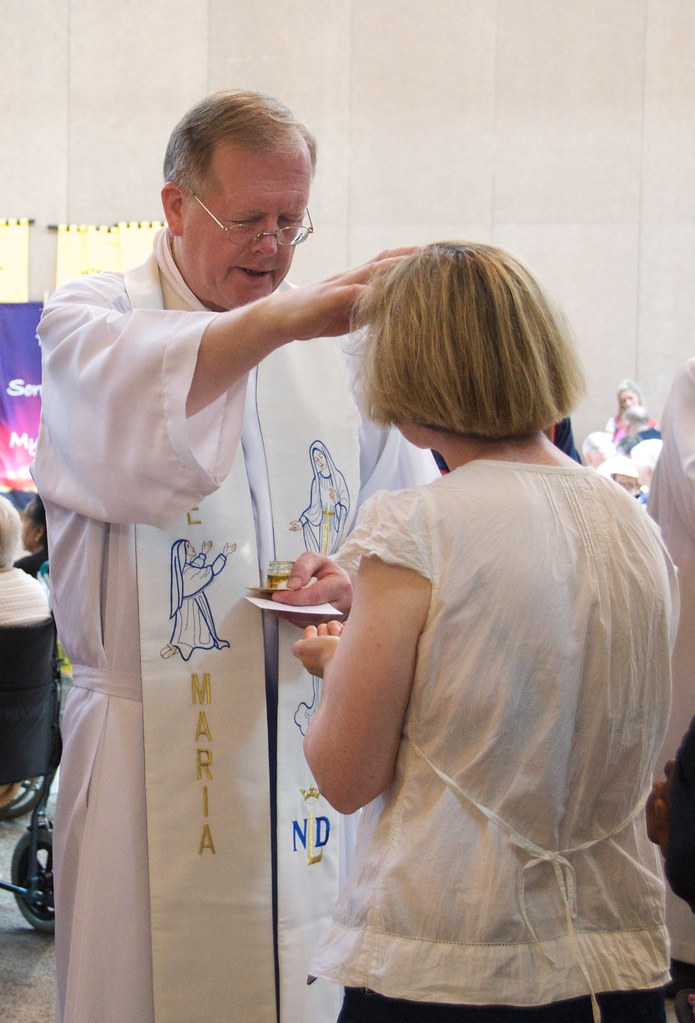On day 2, the pilgrims attended a Mass with the Sacrament of Anointing of the Sick at the chapel of St Bernadette Cote Grotte. Cardinal Vincent Nichols was the principal celebrant, and he was joined by Cardinal Cormac Murphy-O'Connor, Bishop John Sherrington and many priests of the Dioese.
Pride of place was given to the malades, who were the focus of the Mass. Prior to celebrating the Sacrament of Anointing of the Sick, Bishop John preached the homily, which was based on the words of Jesus in Matt 11.28. The full text of the homily is below:

' "Come to me all you who are burdened and I will give you rest." These words of Jesus resonate deeply in our hearts, especially when we recognise our need, particularly in the need of sickness and suffering. It's as though Jesus is saying to us, "place your head close to my heart, on my bosom. Allow me to look after you and I will give you strength to carry the cross which you bear." We can only recognise this need in our community when we come to the Lord with the eyes of faith, believing in him who can heal our hearts.
'"Come to me all you who labour and are overburdened and I will give you rest." St James tells us that Jesus has given the Church a special gift to help us in the journey of sickness, a gift of the Sacrament of the Sick, the anointing with the sacred oil of the sick and the breathing of the Holy Spirit to give life. In the early Church the command comes to us to send for the elders, the priests, that they will pray over the sick and that the prayer of faith will save the sick man, raise him up, forgive his sins and give him the healing, life-giving balm of God.
'This sacrament continues Jesus' ministry to the sick, the way in which Jesus touched and healed those who came to him in their distress. The woman bent double who was able to stand upright after many years. The servant of the centurion who was healed. The healing given to the woman who touched the cloak of Jesus. And this ministry continues as our priests will speak at bedsides, in hospitals. For all of us as priests, we know there are sacred moments when this sacrament has touched the lives of those who are sick and given them strength on the journey of life, given them a healing in different ways that assures them of the presence of Christ, his love and his touch of healing. "Come to me."
I'm reminded of a picture by a German priest, Sigfried Koder. It's of Simon of Cyrene helping Jesus to carry his Cross. So often we think of Simon at the foot of the Cross, walking behind Jesus, but Koder paints a picture in which Simon and Jesus stand shoulder to shoulder together, looking into the future, into the distance, and the Cross, the beam of the Cross is across their shoulders. So together they carry the beam of the Cross. When you look at the picture, you're not sure which is Jesus, and which is Simon. Isn't that often our situation, that Jesus walks unknown with us? That we may have somebody being sent by Jesus walking with us? Each helps the other to carry the cross. There's something mutual about that. And the beam of the cross is held across the shoulders so that the weight is distributed. Jesus walks with us on this journey, looking with us into the future, towards a horizon of hope, a horizon of his kingdom. Further, he says to us, "shoulder my yoke and learn from me, for my burden is light and my yoke is gentle."
As a carpenter, Jesus would probably have made yokes for oxen and cattle. They would have been needed in rural Galilee. The carpenter fashioned the yoke for the particular ox or cow which would be used in labour. It was important to get it right so that there would be no chaffing, no scratching of the wood against the skin of the animal that would lead to a sore, to a wound. And so, the craftsman, the carpenter knew how to fashion the yoke for each particular animal so that it would be comfortable, so that it would be of greatest assistance, so that it could be of the greatest help. And so, Jesus tells today, that this yoke wouldn't hurt, that "shoulder my yoke means that I'm helping you. I'm giving you a yoke to help you to carry your burden, helping you to walk onwards. I know your need. I know you because you are precious to me. And so, shoulder my yoke and allow me to help you on our journey. Walk with me."
As we come to celebrate the Sacrament of the Sick, those of you who are sick, you are invited to place your trust in God's love and healing. We're all invited to do that, but you in a particular way through receiving this sacrament again you're invited to place your trust in Him who knows your heart, to whom you are precious, and you are invited to be healed by Christ, to look ahead towards the horizon. Groaning but quietly awaiting the redemption of our bodies, groaning for a new creation and as St Paul says, "we hope for what we do not see, we wait for it with patience." We pray that this sacrament will give you healing and strength and enable you to look forward, walking with Jesus in hope, in patience, as we all journey towards His kingdom.'




